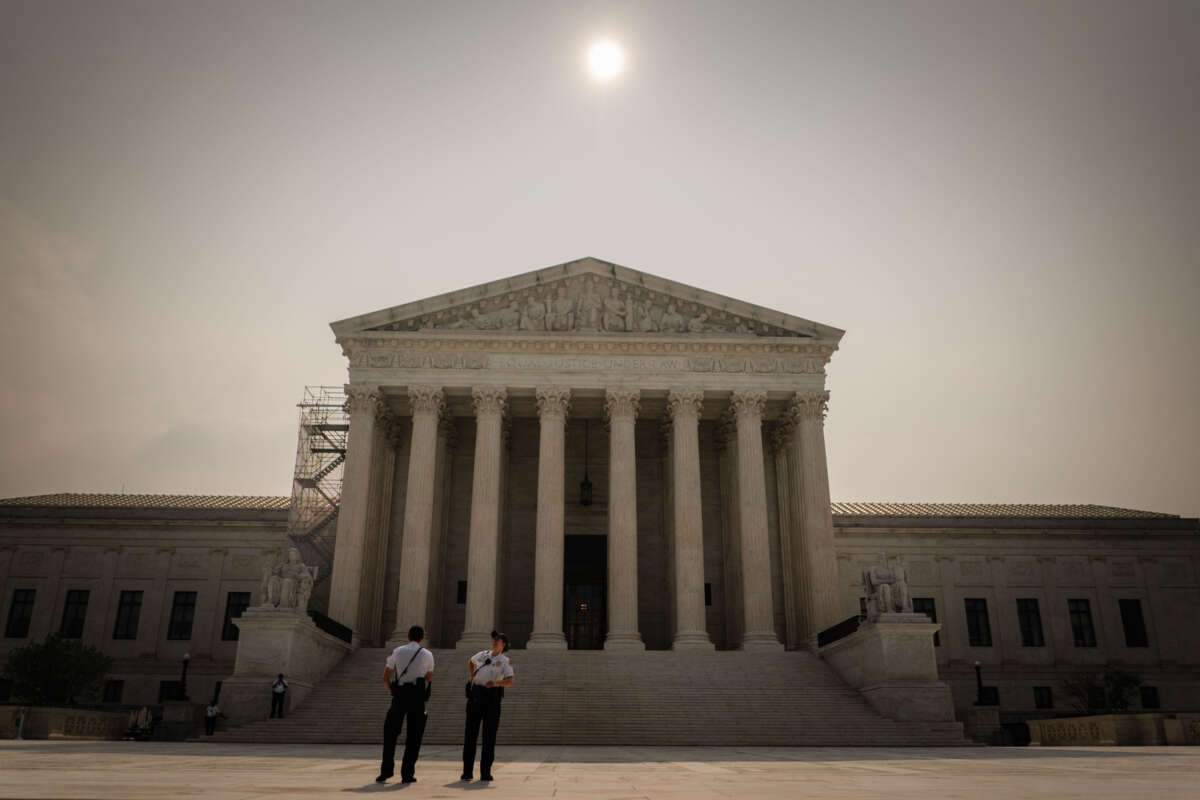Democrats in the Senate Judiciary Committee are taking steps to address corruption on the Supreme Court at a time when the Court is eroding the public’s rights at an unprecedented rate.
On Monday, Judiciary Committee Chair Sen. Dick Durbin (D-Illinois) and Subcommittee on Federal Courts, Oversight, Agency Action, and Federal Rights Chair Sen. Sheldon Whitehouse (D-Rhode Island) announced in a joint statement that the committee will be voting on advancing a bill regarding Supreme Court ethics next week, on July 20.
The committee vote comes as all nine Supreme Court justices have objected to being bound to an ethics code — despite the deluge of reports that have come out in recent months detailing justices accepting lavish gifts, sometimes from people whose firms and businesses had business before the Court.
“The belief that [justices] should not be held accountable or even disclose lavish gifts from wealthy benefactors is an affront to the nation they were chosen to serve. To hold these nine Justices to the same standard as every other federal judge is not a radical or partisan notion,” Durbin and Whitehouse said.
“Since the Court won’t act, Congress will,” they continued.
Even though the Supreme Court is the most powerful court in the U.S., it is subject to far looser rules than other federal courts in the U.S. — and even looser ethics rules than federal employees in far less influential positions in other branches of government.
The Supreme Court Ethics, Recusal, and Transparency (SCERT) Act, reintroduced by Whitehouse and several House Democrats in February, takes aim at tightening the guardrails around the Supreme Court. The bill would require the court to adopt a code of conduct — a longtime call of government watchdogs — and ensure that justices adhere to tighter disclosure standards for gifts and travel.
It would also create stronger rules around recusals for the justices pertaining to potential conflicts of interest regarding gifts, income, lobbying, and other areas that a justice could personally benefit from.
These rules are especially pertinent considering recent reports raising stunning revelations about Justices Samuel Alito and Clarence Thomas that unveiled both justices’ close relationships with conservative activist billionaires and the personal benefits that they have reaped from those connections.
If the bill passes the Democratically-controlled committee, it could then be subject to a full vote by the Senate. SCERT advanced the House Judiciary Committee in the last Congress but was never voted on in the House or the Senate.
It’s unlikely that the bill will see much more movement in this Congress, as Republicans have been defending far right Supreme Court justices’ ability to act with impunity as they deliver a string of long-vaunted wins to some of the U.S.’s most extremist right-wing activists. And the bill wouldn’t undo SCOTUS’s current unprecedented streak of eroding racial equity and yanking away abortion rights and LGBTQ rights.
SCERT is just one of several bills pushed by Democrats in recent months in attempts to curb the power-grabbing Supreme Court. Last month, Sen. Elizabeth Warren (D-Massachusetts) and Rep. Pramila Jayapal (D-Washington) reintroduced a bill that would ensure that the Supreme Court is legally bound to an ethics code, place a cap on the monetary value of gifts that justices are allowed to accept, and tighten oversight over justices’ ability to attend privately funded events.
Angry, shocked, overwhelmed? Take action: Support independent media.
We’ve borne witness to a chaotic first few months in Trump’s presidency.
Over the last months, each executive order has delivered shock and bewilderment — a core part of a strategy to make the right-wing turn feel inevitable and overwhelming. But, as organizer Sandra Avalos implored us to remember in Truthout last November, “Together, we are more powerful than Trump.”
Indeed, the Trump administration is pushing through executive orders, but — as we’ve reported at Truthout — many are in legal limbo and face court challenges from unions and civil rights groups. Efforts to quash anti-racist teaching and DEI programs are stalled by education faculty, staff, and students refusing to comply. And communities across the country are coming together to raise the alarm on ICE raids, inform neighbors of their civil rights, and protect each other in moving shows of solidarity.
It will be a long fight ahead. And as nonprofit movement media, Truthout plans to be there documenting and uplifting resistance.
As we undertake this life-sustaining work, we appeal for your support. Our fundraiser ends at midnight tonight! We still need 163 new monthly donors to hit our goal. Please, if you find value in what we do, join our community of sustainers by making a monthly or one-time gift.
